Get free scan and check if your device is infected.
Remove it nowTo use full-featured product, you have to purchase a license for Combo Cleaner. Seven days free trial available. Combo Cleaner is owned and operated by RCS LT, the parent company of PCRisk.com.
What is "Nonamenba"?
Nonamenba is a scam website group designed to promote dubious software. This variant endorses the Smart Mac Booster Potentially Unwanted Application (PUA). Users, who access these sites are presented with alarms about an alleged threat present on their device.
For removal of this fake virus, Nonamenba offers Smart Mac Booster. Note that no web page can detect threats/issues present on the system, and any claims to this effect cannot be trusted. Furthermore, apps promoted by these sites are often rogue and nonfunctional.
Deceptive/scam sites are commonly opened via redirects caused by intrusive advertisements or PUAs already infiltrated into the device.
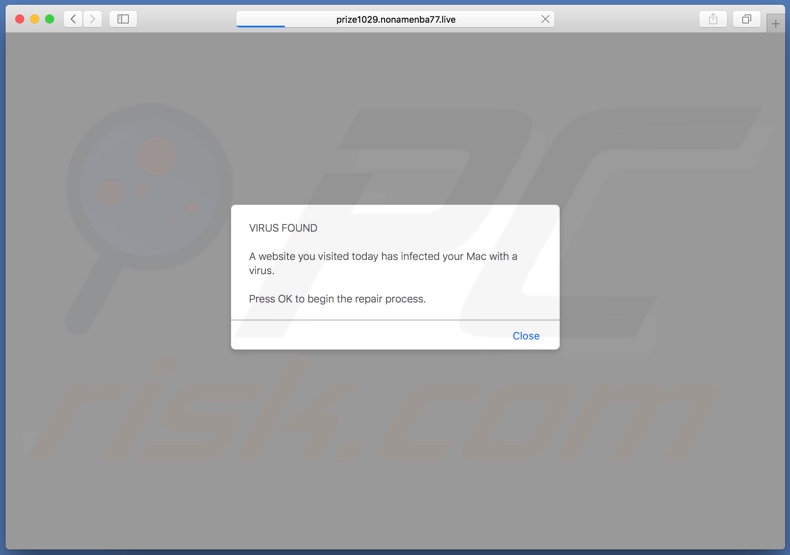
Visitors to Nonamenba first see a pop-up window, which claims that a website visited earlier has infected the MacOS (Mac Operating System) with a virus. Closing this window reveals a different web page, which repeats the initial claim. It also adds that a full system scan is required to find and eliminate dangerous files/applications.
To give the impression of legitimacy, Nonamenba lists the visitor's device details (brand, OS version, browser, IP address, Internet provider and location). The "Scan Now" button starts a fake scan that "finds" a virus called "Bankworm".
To remove this threat, the site recommends downloading Advanced Mac Cleaner, however, attempting this redirects users to the promotional web page of Smart Mac Booster. Downloading this app in fact downloads the maccleaner.pkg file, which is a known to spread various PUAs. As well as being an unwanted application, Smart Mac Booster is rogue software.
Like many other fake Mac cleaners/optimizers (e.g. MacCleansePro, K9-MacOptimizer, Qbit Mac Optimizer, etc.), it requires activation to become operational. Even after activation by making a purchase, however, it remains nonoperational.
PUAs often seem legitimate. They lure users into downloading/installing with offers of a wide variety of "useful" functions. Despite how good these offers may sound, the advertised features are rarely operational. The sole purpose of all unwanted applications is to generate revenue for the developers, and they have many dangerous capabilities to achieve this.
PUAs can cause redirects to sale-based, untrustworthy, deceptive/scam and malicious websites. They also run intrusive advertisement campaigns. The ads they deliver severely diminish the browsing experience and carry certain risks due to the harmful sites they redirect to, and for their ability to stealthily download/install unwanted content.
Some apps within this classification can make unauthorized changes to browsers (hijack them) and promote fake search engines. Most PUAs can also track data relating to browsing activity. Information of interest includes browsing and search engine histories, IP addresses, geolocations, and personal details.
This sensitive data can then be shared with third parties and end up being used for criminal purposes. To summarize, PUAs can cause browser and system infiltration/infections, and lead to financial loss, serious privacy issues, even identity theft. To ensure device and user safety, all suspicious applications and browser extensions/plug-ins must be removed immediately.
| Name | Nonamenba pop-up |
| Threat Type | Phishing, Scam, Mac malware, Mac virus. |
| Fake Claim | These pages claim that the visitor's Mac is infected with a virus. |
| Detection Names | Fortinet (Spam), Spamhaus (Spam), Full List (VirusTotal) |
| Serving IP Address | 193.35.51.3 |
| Related Domains | Full list below. |
| Promoted Unwanted Application | Smart Mac Booster |
| Symptoms | Your Mac becomes slower than normal, you see unwanted pop-up ads, you are redirected to dubious websites. |
| Distribution methods | Deceptive pop-up ads, free software installers (bundling), fake Flash Player installers, torrent file downloads. |
| Damage | Internet browser tracking (potential privacy issues), display of unwanted ads, redirects to dubious websites, loss of private information. |
| Malware Removal (Windows) |
To eliminate possible malware infections, scan your computer with legitimate antivirus software. Our security researchers recommend using Combo Cleaner. Download Combo CleanerTo use full-featured product, you have to purchase a license for Combo Cleaner. 7 days free trial available. Combo Cleaner is owned and operated by RCS LT, the parent company of PCRisk.com. |
Nonamebnm, Smmhck, Nothsws, and Badmonday are a few examples of scam page families identical to Nonamenba. Scams of this kind often use scare tactics to urge visitors into downloading/installing/purchasing the content they endorse. This manifests as various alarms, alerts and warnings of detected threats/issues, or of an outdated piece of crucial software.
The sites then advertise software/updates, which will allegedly rid users of these fake problems.
How did potentially unwanted applications install on my computer?
Some PUAs (such as Smart Mac Booster) have "official" promotional websites, from which they can be downloaded/purchased, however, these apps can also be downloaded/installed together with other products. This deceptive marketing technique of pre-packing regular software with unwanted or malicious content is called "bundling".
Rushing download/installation processes (e.g. ignoring terms, skipping steps, etc.) increases the risk of unintentionally allowing bundled applications onto systems. Another source of PUAs are intrusive advertisements. When clicked, these can execute scripts to make rogue downloads/installations.
How to avoid installation of potentially unwanted applications
Research all content, before downloading/installing. Use only official and verified download channels, as opposed to P2P sharing networks (BitTorrent, eMule, Gnutella, etc.), free file-hosting sites, or other unofficial/third party downloaders. Treat download and installation processes with caution.
Read the terms, explore all available options, use the "Custom/Advanced" settings, and opt-out of additional apps, tools, functions, etc. Intrusive ads typically seem normal and harmless, however, they redirect to dubious web pages (e.g. pornography, gambling, adult-dating and others).
If you experience these ads/redirects, check the device and remove all dubious applications and/or browser extensions/plug-ins without delay. If your computer is already infected with PUAs, we recommend running a scan with Combo Cleaner Antivirus for Windows to automatically eliminate them.
Text presented in the pop-up window:
VIRUS FOUND
A website you visited today has infected your Mac with a virus.
Press OK to begin the repair process.
Second web page displayed by Nonamenba:
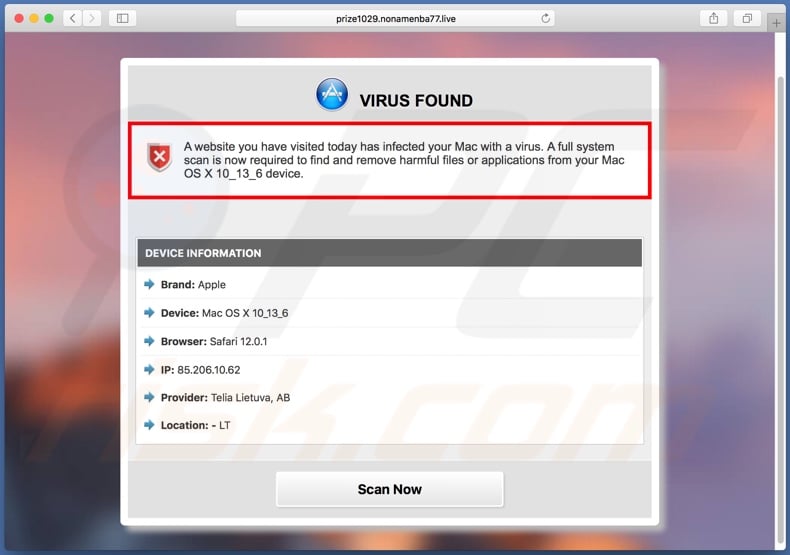
Text presented in this page:
VIRUS FOUND
A website you have visited today has infected your Mac with a virus. A full system scan is now required to find and remove harmful files or applications from your Mac OS X 10_13_6 device.
DEVICE INFORMATION
Brand: Apple
Device: Mac OS X 10_13_6
Browser: Safari 12.0.1
IP: 85.206.10.62
Provider: Telia Lietuva, AB
Location: - LT
Scan Now
Results of the fake scan:
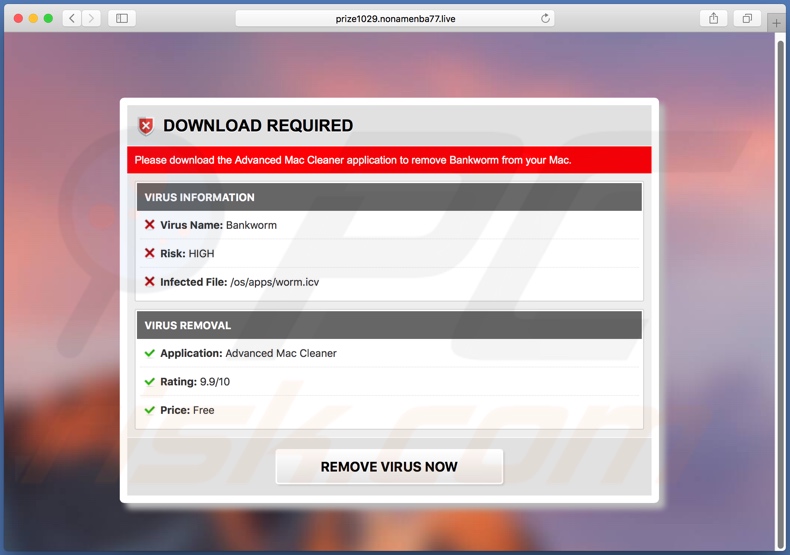
Text presented in this page:
DOWNLOAD REQUIRED
Please download the Advanced Mac Cleaner application to remove Bankworm from your Mac.
VIRUS INFORMATION
Virus Name: Bankworm
Risk: HIGH
Infected File: /os/apps/worm.icv
VIRUS REMOVAL
Application: Advanced Mac Cleaner
Rating: 9.9/10
Price: Free
REMOVE VIRUS NOW
Appearance of Nonamenba scam (GIF):
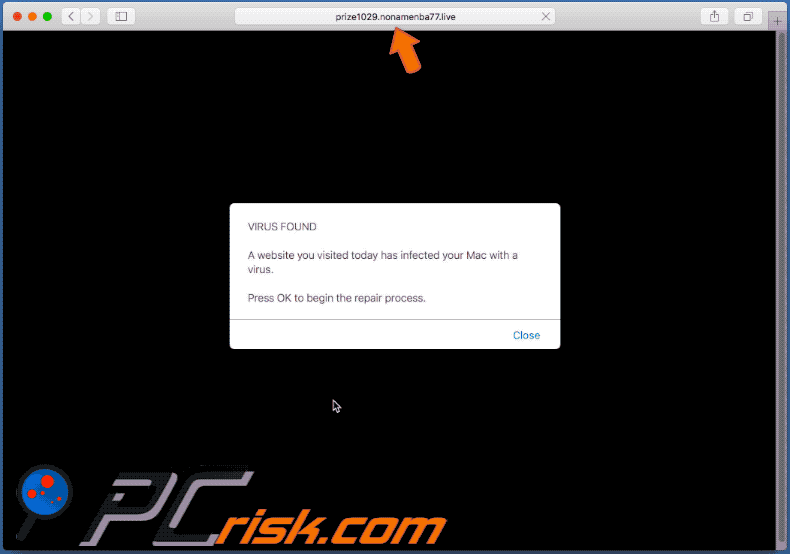
List of domains relating to the Nonamenba domain family:
| nonamenba12.live |
| nonamenba18.live |
| nonamenba24.live |
| nonamenba29.live |
| nonamenba3.live |
| nonamenba41.live |
| nonamenba55.live |
| nonamenba63.live |
| nonamenba77.live |
| nonamenba90.live |
Installation setup of Smart Mac Booster:
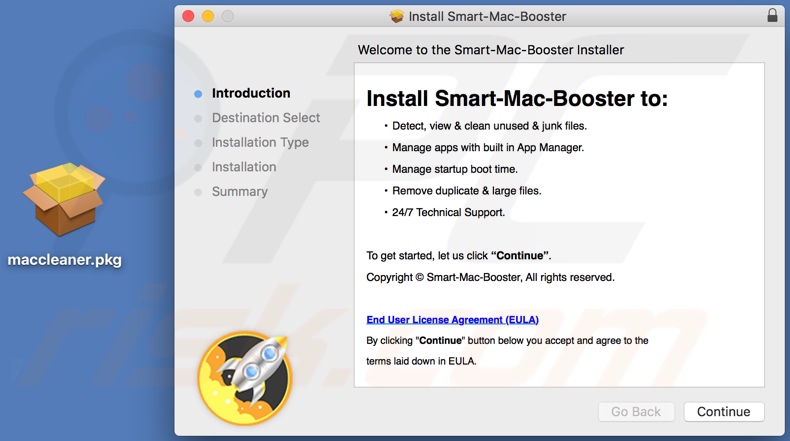
Appearance of Smart Mac Booster application:
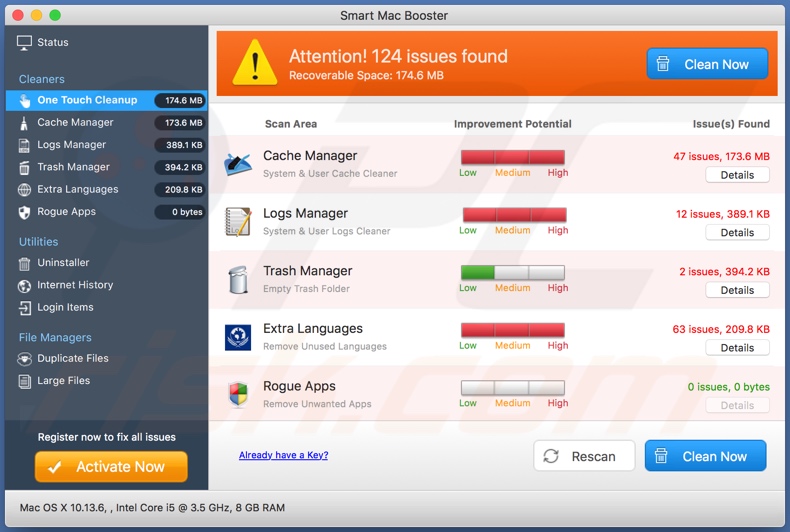
Instant automatic malware removal:
Manual threat removal might be a lengthy and complicated process that requires advanced IT skills. Combo Cleaner is a professional automatic malware removal tool that is recommended to get rid of malware. Download it by clicking the button below:
DOWNLOAD Combo CleanerBy downloading any software listed on this website you agree to our Privacy Policy and Terms of Use. To use full-featured product, you have to purchase a license for Combo Cleaner. 7 days free trial available. Combo Cleaner is owned and operated by RCS LT, the parent company of PCRisk.com.
Quick menu:
- What is Nonamenba pop-up?
- How to identify a pop-up scam?
- How do pop-up scams work?
- How to remove fake pop-ups?
- How to prevent fake pop-ups?
- What to do if you fell for a pop-up scam?
How to identify a pop-up scam?
Pop-up windows with various fake messages are a common type of lures cybercriminals use. They collect sensitive personal data, trick Internet users into calling fake tech support numbers, subscribe to useless online services, invest in shady cryptocurrency schemes, etc.
While in the majority of cases these pop-ups don't infect users' devices with malware, they can cause direct monetary loss or could result in identity theft.
Cybercriminals strive to create their rogue pop-up windows to look trustworthy, however, scams typically have the following characteristics:
- Spelling mistakes and non-professional images - Closely inspect the information displayed in a pop-up. Spelling mistakes and unprofessional images could be a sign of a scam.
- Sense of urgency - Countdown timer with a couple of minutes on it, asking you to enter your personal information or subscribe to some online service.
- Statements that you won something - If you haven't participated in a lottery, online competition, etc., and you see a pop-up window stating that you won.
- Computer or mobile device scan - A pop-up window that scans your device and informs of detected issues - is undoubtedly a scam; webpages cannot perform such actions.
- Exclusivity - Pop-up windows stating that only you are given secret access to a financial scheme that can quickly make you rich.
Example of a pop-up scam:

How do pop-up scams work?
Cybercriminals and deceptive marketers usually use various advertising networks, search engine poisoning techniques, and shady websites to generate traffic to their pop-ups. Users land on their online lures after clicking on fake download buttons, using a torrent website, or simply clicking on an Internet search engine result.
Based on users' location and device information, they are presented with a scam pop-up. Lures presented in such pop-ups range from get-rich-quick schemes to fake virus scans.
How to remove fake pop-ups?
In most cases, pop-up scams do not infect users' devices with malware. If you encountered a scam pop-up, simply closing it should be enough. In some cases scam, pop-ups may be hard to close; in such cases - close your Internet browser and restart it.
In extremely rare cases, you might need to reset your Internet browser. For this, use our instructions explaining how to reset Internet browser settings.
How to prevent fake pop-ups?
To prevent seeing pop-up scams, you should visit only reputable websites. Torrent, Crack, free online movie streaming, YouTube video download, and other websites of similar reputation commonly redirect Internet users to pop-up scams.
To minimize the risk of encountering pop-up scams, you should keep your Internet browsers up-to-date and use reputable anti-malware application. For this purpose, we recommend Combo Cleaner Antivirus for Windows.
What to do if you fell for a pop-up scam?
This depends on the type of scam that you fell for. Most commonly, pop-up scams try to trick users into sending money, giving away personal information, or giving access to one's device.
- If you sent money to scammers: You should contact your financial institution and explain that you were scammed. If informed promptly, there's a chance to get your money back.
- If you gave away your personal information: You should change your passwords and enable two-factor authentication in all online services that you use. Visit Federal Trade Commission to report identity theft and get personalized recovery steps.
- If you let scammers connect to your device: You should scan your computer with reputable anti-malware (we recommend Combo Cleaner Antivirus for Windows) - cyber criminals could have planted trojans, keyloggers, and other malware, don't use your computer until removing possible threats.
- Help other Internet users: report Internet scams to Federal Trade Commission.
Share:

Tomas Meskauskas
Expert security researcher, professional malware analyst
I am passionate about computer security and technology. I have an experience of over 10 years working in various companies related to computer technical issue solving and Internet security. I have been working as an author and editor for pcrisk.com since 2010. Follow me on Twitter and LinkedIn to stay informed about the latest online security threats.
PCrisk security portal is brought by a company RCS LT.
Joined forces of security researchers help educate computer users about the latest online security threats. More information about the company RCS LT.
Our malware removal guides are free. However, if you want to support us you can send us a donation.
DonatePCrisk security portal is brought by a company RCS LT.
Joined forces of security researchers help educate computer users about the latest online security threats. More information about the company RCS LT.
Our malware removal guides are free. However, if you want to support us you can send us a donation.
Donate
▼ Show Discussion